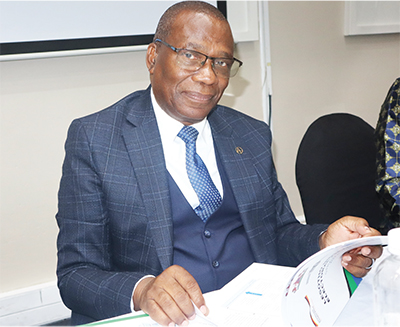By: Thoboloko Ntšonyane
MASERU – The Independent Electoral Commission (IEC) announces its four-year strategic plan 2024-2028 and checkpoints.
It “is going to serve as a tool for the effective and efficient performance and professionalization of the election administration and fast track [its] growth”.
Through this 54 page plan, IEC sets the direction for growth and success in its broader responsibilities.
Section 66A of the Constitution charges IEC with the responsibility:
“To ensure that elections to the National Assembly and local authorities are held regularly and that every election or referendum held is free and fair.
To organize, conduct and supervise, in an impartial and independent manner, elections to the National Assembly and referenda under the provisions of this Constitution and any other law;
“To delimit the boundaries of constituencies in accordance with the provisions of this Constitution and any other law;
“To supervise and control the registration of electors;
“To compile a general register of electors and constituency registers of electors for the several constituencies and to maintain such register or registers up to date.
“To promote knowledge of sound democratic electoral processes; eg. to register political parties;
“To ascertain, publish and declare the results of elections and referenda;
“To adjudicate complaints of alleged irregularities in any aspect of the electoral or referendum process at any stage other than in an election petition;
“And to perform such other functions as may be prescribed by or under any law enacted by Parliament.”
The commission’s Chairperson Mphasa Mokhochane says this strategy provides a clear roadmap future of election management.
“The strategic plan constitutes the commitment to serve the citizens of Lesotho and all key stakeholders in the electoral process and practice.
“It builds on the commission’s achievements on the significant and broad institutional implementation plan that provides clear goals to realize the commission‘s mandate and enable performance of the commission to be measured,” he says.
He says citizens, particularly voters and stakeholders, will be able to appraise IEC’s performance through this strategic plan.
The commission reports that the strategic plan is effort directed towards a consultative process where different sectors of the society are engaged, including and not limited to political parties, media and civil society organizations.
The strategic plan exemplifies commitment to integrity, inclusivity, impartiality, good governance, excellence and leadership.
The former Chairperson of the commission Advocate Leshele Thoahlane congratulates IEC for the strategy, highlighting its capacity in disseminating information.
He expresses confidence in the competence of voter education division.
“This is a very good document, it will be a remiss of us not to congratulate you,” he says.
He then challenges the commission to engage the National University of Lesotho’s (NUL) political science division to share and lead conversations for the betterment of the election process. This he charges as a way to contribute and increase the interest in elections.
Supported by the United Nations Development Programme (UNDP) and the German government, IEC’s strategic plan is said to be reviewed on periodic intervals, “deemed appropriate by management”.
Meanwhile, there are calls for this exercise to be undertaken on an annual basis.
Also taking stock of the strategy Futho Hoohlo, a politician, challenges the commission to engage in regular self-assessment and subject the document to everyone working for the commission to ensure inclusivity.
“Let us be part of the annual business plans as your most important stakeholders so that we are able to assess your performance, we are able to input into the mid-term review of this strategic plan,” he contributes.
During the four-year roll-out of the strategic plan, the performance of the commission will be assessed on the targets it has made.
These include the 95% clean and up-to-date voters’ roll; voter registration system with appropriate infrastructure functioning at 95%; percentage of new eligible registrations; percentage of increase in new voter registration turnout in all types of elections; the number of partnerships involved in voter registrations and civic voter education; 100% reach out to eligible voters with civic and voter education messages; 100% of stakeholders have access to voters’ roll on request and the number of people in the diaspora and internally displaced persons (IDPs) appearing on voters’ roll.
“By the end of 2028, the IEC will have 95% of the voters roll up to date, based on a continuous registration system, and in synchrony with the NICR [National Identity Civil and Registration] and attain at least 75% voter turnout in all election types.
“By the end of the strategy period, all IEC Managers and officials are knowledgeable in election management and demonstrate competence in carrying out operations across the electoral cycle” reads the ambitious IEC’s plan.


